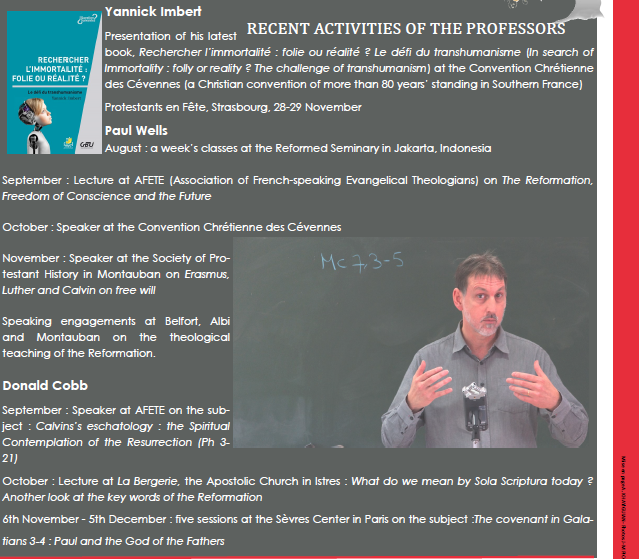Faculté Jean Calvin equipped me to serve the Church
Samuel Kamano
I came to Aix-en-Provence from Guinea in West Africa in September 1992. My wife and three daughters (Cécile, Anne, Kaffa and Dorcas) came to join me in May 1993.
I came to the Faculté Jean Calvin because I wanted to get a better grasp of Reformed theology in all its diversity. From very early on I was excited to be exploring so many different areas of theology (soteriology, ethics, ecclesiology and practical theology etc.) and I enjoyed all the courses. The teaching was interesting and highly motivational, so boosted my enthusiasm for academic work. I made good progress though it was a real challenge for me to get through the academic program and I had to put in a lot of hard work.
What I was taught at the Faculté Jean Calvin equipped me to serve the Church in Guinea. Reformed education not only impacted my pastoral ministry but also enabled me to be useful to my country in various ways.
- National Reconciliation
Guinea has been through some very difficult times in recent history. From 2006 to 20O9 the whole country was in turmoil and we were even on the brink of civil war. During this time God used the Christian Council of Guinea, made up of the leaders of the three major churches (Catholic, Protestant and Anglican) to find a peace process, and indeed, lasting solutions were found. At that time, I was writing my doctoral thesis on Psalm 85 (Righteousness and peace kiss each other).
- Church planting in Conakry City
When I came back to Guinea in January 1997 the leaders of my church put me in charge of a local church in the capital with 150 members. Having defined my objectives and set up a plan of action I started working hard, putting into practice all the pastoral techniques I had learned at the Faculté Jean Calvin. Before long there were eight large churches in the Conakry area.
- Media (National Radio and Television)
I have both trained preachers to take the gospel to unreached peoples and set up a team of technicians to produce films to help people become aware of the issues that plague our society and to teach a biblical view of civic responsibilities.
- President of the EPEG (l’Eglise Protestante Evangélique de Guinée) In April 2006, during the most difficult period in our country, the National Council of the Evangelical Protestant Church of Guinea asked me to become its president. Lots of things have happened in the life of EPEG, lots of progress has been made but it hasn’t been all smooth sailing.
- Founding a school in the city of Conakry
On our return to Guinea in October 1997 we founded a school (nursery, elementary and secondary) in Enta Sud Fassa, Conakry. Since that time God has blessed us in so many ways. At present there are 1,725 students in the school. Soli Deo Gloria! For two years we tried to get the Guinean Secretary of State to visit the school and finally he came. He was surprised by what he saw and this is what he said: "I enrolled all my children in Emmaus school as soon as it opened because I knew that Christians provide a good education. I could have sent them anywhere, to a French school, for example, but something attracts me to this place, something that I find nowhere else..." Our response? "In God we will do mighty deeds".
Samuel Kamano
To keep the flame alive!
As we recently celebrated just over 500 years since the Protestant Reformation we felt grateful for one of the most important treasures this movement entrusted to future generations: submissive and intelligent commitment to the Bible, the ability to discern the truth in the text, to distinguish between good and bad interpretations and to listen to the voice of God revealed in the Scriptures. The spirit of the Reformation leads us into thinking in a way that is captive to Christ and his kingdom, wholly other than all imposed dogmas and issues pushed by the contemporary powers of "this world". If the church is to fulfill its calling, it must remain faithful to this inheritance. Should the church stray from its true vocation, it is liable to fall prey to the pressures of power groups, ideological factions and economic trends.
The Kingdom of God is based on a different mindset from the one that governs the social and political fabric of this world (Mk 10:35-45).
The principles of life and the norms of behaviour that correspond to the calling of the church must be governed by Christ’s mindset. As we remember the Reformation ideal, we can affirm that the church is, or should be, a community that hears in the Biblical text a voice that speaks louder than the multiple voices in society which seek to control the way we think and behave.
And such is the vocation of the Faculté Jean Calvin: to keep the flame of this ideal alive! By supporting the work of the FJC, you are helping to ensure that the church in the French-speaking world (and beyond!) can still be trained and equipped to respond faithfully to the Master's call.
Rodrigo F. de Sousa
Professor of Hebrew and Old Testament
Director of Master’s Program
Faculté Jean Calvin














